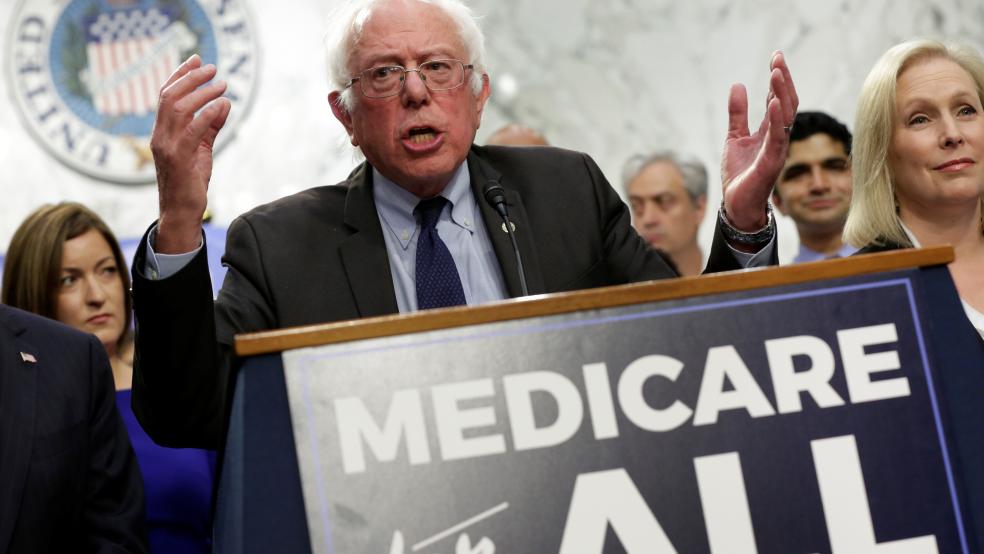Any Democrat proposing a transition to a Medicare-for-all system can expect to be pressed on a pivotal question: How do you plan to pay for it?
The price tag: Various estimates have pegged the cost of a Medicare-for-all system at around $2.5 trillion to $3 trillion a year.
A widely publicized and much-debated report by Charles Blahous of the libertarian Mercatus Center recently concluded that the plan put forth by Sen. Bernie Sanders (I-VT) “would, under conservative estimates, increase federal budget commitments by approximately $32.6 trillion during its first 10 years of full implementation.”
Sanders’ own estimate was $13.8 trillion for the first 10 years. But Kenneth Thorpe, a professor of health policy at Emory University, put the cost at $24.3 trillion over a decade, the Committee for a Responsible Federal Budget estimated it at $25 trillion and analysts at the Urban Institute put the cost at $32 trillion.
For context, the U.S. Treasury took in about $3.3 trillion in fiscal 2017, so whatever the actual cost of a Medicare-for-all plan would be — and that would depend on the details of such a plan — enacting such a system clearly represents a significant expansion of the federal government and its spending.
The debate: Where would that money come from? The answer may matter a great deal, at least politically, if or when Democrats try to come together behind a specific plan and sell it to voters — even if those voters overwhelmingly support the basic idea of Medicare for all. But pundits on the left have a somewhat counterintuitive answer: We’re asking the wrong question.
“[T]he truth is that the people who think they are being hard-headed and asking for specifics are missing the point of a proposal like universal health coverage,” writes The Washington Post’s Paul Waldman. “So let me suggest a different question that might be asked not to those advocating Medicare-for-all, but to those opposing it and those journalists assuming it is unrealistic: How do you propose to come up with the $50 trillion you want to spend on health care over the next 10 years?”
Waldman’s $50 trillion figure is extrapolated from Centers for Medicare and Medicaid Services projections showing that America will spend about $3.7 trillion on health care this year, both publicly and privately, rising to $5.7 trillion by 2026. That’s under current law, not a Medicare-for-all system.
“Where will that money come from?” Waldman asks. “Well, from all of us. It will come in the form of taxes that pay for Medicare, Medicaid, the Children’s Health Insurance Program and Veterans Affairs. It will come in the form of premiums taken out of paychecks, and co-pays, and deductibles. It will be paid by the American people, one way or another.”
So if a Medicare-for-all plan and other elements of the progressive or Democratic Socialist agenda cost $40 trillion combined, we’re still saving about $10 trillion, he says. Similarly, over at The Week, Ryan Cooper estimates that a Medicare-for-all program that dramatically wrings costs out of our system could reduce national health spending by roughly $11 trillion over a decade (check out his piece to see the details and assumptions involved).
“That $11 trillion could easily fund a generous paid leave scheme, top up Social Security and disability benefits, and pay for a solid green infrastructure program, with a lot left over,” he writes. “To get that money, we'll have to drastically restructure the health-care system and pay a bit more in taxes. But make no mistake, the national savings would be tremendous.”
Why it matters: As the debate over Medicare for all continues into the 2020 election cycle, expect to hear a lot more of this argument from advocates on the left: The real issue isn’t that we can’t afford a single-payer plan, it’s that we can’t afford to go on with our current system. Will voters agree — or will the prospect of another massive change to their health care, with the higher taxes required to pay for it, put them off?




